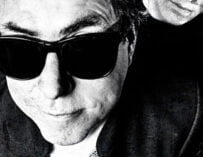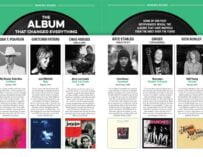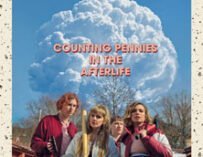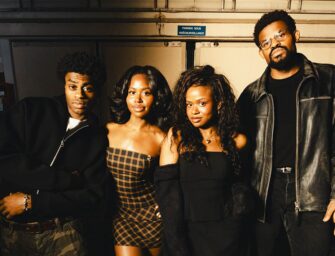
The Wolfhounds: “I know some people who are in young bands and those that aren’t from posh backgrounds are really struggling!”
As the 80s indie heroes return with their first ‘proper’ studio album in 26 years, Songwriting meets frontman Dave Callahan
Formed in Romford in 1985, The Wolfhounds first came to public attention with their 1986 single Anti-Midas Touch, which received extensive Radio 1 airplay from the likes of John Peel and Janice Long. An appearance on the scene-defining C86 compilation released by the NME that same year established their position among the indie royalty of the era, and the band would go on to release four albums before splitting up in 1990.
Founder Dave Callahan then drifted in and out of bands during the 90s, until The Wolfhounds got back together to play a 20th anniversary gig in 1985. A C86 showcase at the ICA followed in 2006, and the band have been recording and playing live ever since, starting with a series of sporadic singles that led eventually to 2014 album Middle-Aged Freaks.
This month, though, Untied Kingdom (Or How To Come To Terms With Your Culture) sees The Wolfhounds releasing their first ‘proper’ album since reforming. The album flits back and forth between lo-fi, folk-tinged recordings and the kind of cascading, jangling guitar assaults with which they first made their name, while lyrically the most obvious theme is a sense of discontentment with the modern world. Diverse, fiery and at times stridently political, it’s a fine return to form.
We got Dave on the phone to find out more…
Let’s start by talking about the title of the new album: Untied Kingdom (Or How To Come To Terms With Your Culture)…
“Well, ‘untied kingdom’ is a common keyboard mistake, like typing ‘teh’ instead of ‘the’ – in fact, one website even ‘corrected’ the album title to United Kingdom! But no, it’s meant to be like that. It’s a little bit pretentious I suppose, but having written all the songs over the period of a few years, the whole thing seemed to be so influenced by the state of the country at the moment.
“And also, because I’m of a certain age, it’s kind of looking back at the way the country’s been over the past few decades as well. We finished recording and mixing the album just after the Brexit vote, and it seemed like Britain, the tolerant Britain that I thought it was, seemed to be shaking a bit at its foundations. And it still seems to be. So it was coming to terms with your friends and neighbours having wildly different opinions to you.”
I was just wondering if you’d read the novel of the same name, by James Lovegrove, because it deals with quite similar topics…
“I haven’t read that, no! I’d be quite keen on having a look, though, is it any good?”
I thought so. It’s about the breakdown of society, a theme which comes across a lot in the lyrics of the album. The other theme that I noticed in the lyrics was a sense of nostalgia…
“Yeah, but I like to think it’s a realistic nostalgia rather than a warm, fuzzy nostalgia.”
Oh yeah, definitely… it’s actually quite grim in places!
“[Laughs] Do you think so?”
In a good way – like in My Legendary Childhood, which paints a very realistic picture of growing up in Britain in the 70s and 80s.
“Well, part of that was because we’ve had quite a few songs reissued on various C86 and indie-pop revival compilations, and there’s a been a lot of articles online about how great that period was and so on. But I actually look back and remember it being a time of penury, a time when I couldn’t afford to live most of the time. A bit like it must be for kids who are 19, 20 now… in fact I know it is, because I know some people who are in young bands and those that aren’t from posh backgrounds are really struggling!
“And yet it seems a lot of people are looking back through kind of misty eyes, whereas what I remember is scraping around. So I wanted to put a more realistic light on that nostalgia for ‘the heyday of indie-pop’.”

Dave: “If you come and see The Wolfhounds live, we’ll be quite ragged but we’ll also be energetic and angry and exciting.”
Why is there so much interest in that era right now, do you think?
“I think for similar reasons that there was still an interest in 60s garage music then… a lot of it is pretty good music as far as guitar-based songs go. But also the original exponents have probably had their kids leave home, they’re able to buy the records they didn’t buy the first time around and reflect on their youth, and they still like to go out to gigs. And also the whole thing’s kept going… there are indie-pop festivals all over the world now, in places like Chile and Greece and southeast Asia.
“It’s like heavy metal used to be in the 80s: on every continent there’s a hardcore set of several thousand people who love the raw guitar pop of the 80s, which at the time most of the journalists and radio despised! They under-rated it completely. There was the odd period where it got written about and played on the radio, but mostly it was rejected as kind of backward-looking”
Does it come back to the political aspects as well, to some extent? Because as an ageing former 80s indie-kid, what gets me about modern ‘indie’ bands is that they’re always smiling and singing these happy, anthemic songs aimed right at the main stage at Glastonbury…
“To my ear, a lot of it is very bland, there’s a lot of bland sentiments and blandly produced music. I think anyone who’s really into music nowadays – apart from the hardcore fans of mainstream acts – listens in some way to what would be classed today as quite raw music. There’s been a big revival in African music, 60s garage persists, and people are looking back at 80s guitar music. I think people are looking back to a time when things were more immediate, when things were rawer and rougher.
“And that’s how I’ve always liked my music. I’ve never changed, so it’s quite nice that we seem to have an audience again for similar reasons! If you come and see The Wolfhounds live, we’ll be quite ragged but we’ll also be energetic and angry and exciting. I hope! We haven’t reformed to be bland… we’ve reformed as a creative enterprise.”
Speaking of reforming, this is the second album since you got back together. What was the impetus for getting the band back together in the first place?
“It’s the second album yes, but the first that was recorded as an album rather than being cobbled together from singles. As for reforming, it was kind of accidental. I had a band in the 90s called Moonshake, then I moved to New York for a while and found myself just hating music for a while. I got pretty depressed because I’d been doing it all my life and I just got tired of it – I was still poverty-stricken, and I didn’t really feel it was worth doing any more. Then I had another go with another little band when I came back called The Surplus, and that didn’t really work out, and I just didn’t do anything for a few years.
“And then Bob Stanley organised a C86 20-year reunion at the ICA. We’d actually done a little reunion gig before that, but that was just a one-off. And then Bob Stanley got in touch, and I’d enjoyed the other show so much we said yes. And it went really well, but even then I thought that would be it. And then a few weeks later I got an email of Andy [Golding, Wolfhounds co-founder], saying ‘I really liked that, I’ve got a few songs, what about you?’ And I said, ‘Yeah, I’ve got a backlog of about a decade’s worth!’ So that was that.”
So you did keep writing, even when you weren’t making music?
“Even though I stopped being in bands, I’d still wake up in the middle of the night and write lyrics down. Or because I’m a bit of an insomniac, I’d sit and play guitar to calm myself down. So I just naturally sort of excreted songs… and because I’m not a very self-satisfied person, I’d then have to work them up to where they were the equal of anything I’d actually recorded.
“It was kind of scary getting back into a band, because music tends to kind of take over, and I have a life now: I have children to look after, I have a day job. But even so, we’ve got a Wolfhounds album coming out, I’ve got a solo album that I haven’t mixed yet, there are electronic things on the back-boiler that I hope to do next year… this is what I feared would happen, that music would take over all over again and eventually ruin my life! [Laughs]”

The Wolfhounds: “I can see the advantage of polishing or sculpting an idea until it’s what you really mean.”
Do you feel there are things you learned in Wolfhounds Mk 1 that you can apply in Wolfhounds Mk 2, to make life easier for yourself?
“Well, in Wolfhounds Mk 1, I was very obsessed with keeping the inspiration in things, so I wouldn’t correct things. I’d leave what I now consider to be quite embarrassing and bad lines in, kind of on purpose. Which isn’t a very mature attitude, but it was the one I had – I wanted it to be warts-and-all. Whereas now I can see the advantage of polishing or sculpting an idea until it’s what you really mean. So it retains the inspiration, but it might only have two words of what I first wrote!
“For instance, on the song Cheer Up that we put out two years ago, the only thing remaining from that is the chorus – I completely rewrote the three verses over and over again. I’ve probably got seven drafts and the original bears no relation to what ended up on the records! I’m really determined to hone what I do now, whereas before it was more like an action painting.”
So if I asked you for advice for young songwriters, would that be it? Take your time and hone your songs properly?
“Yeah, but not in the sense that you end up in a nice smooth, smile-y indie-rock band on Later… With Jools Holland! Hone the ideas: try and grow the concept and the vision of what you’re doing, whether it’s lo-fi and borderline unlistenable or grandiose and Orson Welles-like. There’s nothing to be achieved, other than the remote possibility of commercial success, by just being smooth and easily palatable. I would say just chase ideas down to their logical conclusion; perhaps chase them further, and then rein them back!”
You mentioned keeping things raw in the old days. One thing I noticed on the new album is that several of the tracks are more like ‘takes’… there’s a long run-in, you can hear someone coughing in the studio, stuff like that. Was that deliberate nod to your past?
“It’s not even as contrived as that. There’s one track, Oppositeland, that was recorded on an iPhone; it’s just me playing an acoustic late at night, because the feeling on that first raw demo was better than the one where we recorded it properly. And the opening one, Apparition, has two studio vocals, but the rest of it was again recorded on an iPhone as I was walking round Alexandra Park singing to myself. That’s why you can hear woodpeckers and wrens in the background!”
So even if it wasn’t a deliberate move, that punk rock, keeping it raw attitude hasn’t gone away entirely?
“No, not at all. I don’t really like bland music. Now that we can record so purely and cleanly on computers, you have to do something to stick some grit in there. It’s like a bird eating stones to help it digest.”
Interview: Russell Deeks
Untied Kingdom (Or How To Come To Terms With Your Culture) is out now on Odd Box Records
A legal matter
The Wolfhounds’ return coincides with a bid to regain the rights to their 1980s recordings. Tom Walsh has the details…
The Wolfhounds recently launched an online petition to regain the copyrights to their early material from Warner/Chappell, which collected nearly 700 signatures before it forced the company into negotiations.
Dave Callahan says the band have missed out on 27 years’ worth of royalty payments, after a legal dispute in the band’s heyday saw the company claim ownership of much of The Wolfhounds’ back catalogue, with the writing credits also being altered for over 20 of their best-known songs to omit Callahan and guitarist Andy Golding.
Callahan explains: “The matter of principle is to get our songs back and get our names back in the brackets. Also, they’ve been receiving money over these years and they haven’t properly accounted for it, so I want to know how much money we have missed out on and get it back.”
Many of their early songs, including Top 10 independent hit The Anti-Midas Touch, have been reissued on various labels – most notably on revisions of the legendary NME compilation C86 – but the members have received no royalty payments for these.
“All I want is a legal and satisfactory settlement,” says Callahan. “I’m not going to get millions or fame, but I just want a bit of justice and what we’re owed, and doing the petition has meant that they’ve acted quicker.”
The band were in negotiations with the company at the time of writing.







![Interview: Jessie Jo Dillon [2025]](https://www.songwritingmagazine.co.uk/wp-content/uploads/jessie-jo-dillon-2-by-libby-danforth-335x256.jpg)

























Related Articles